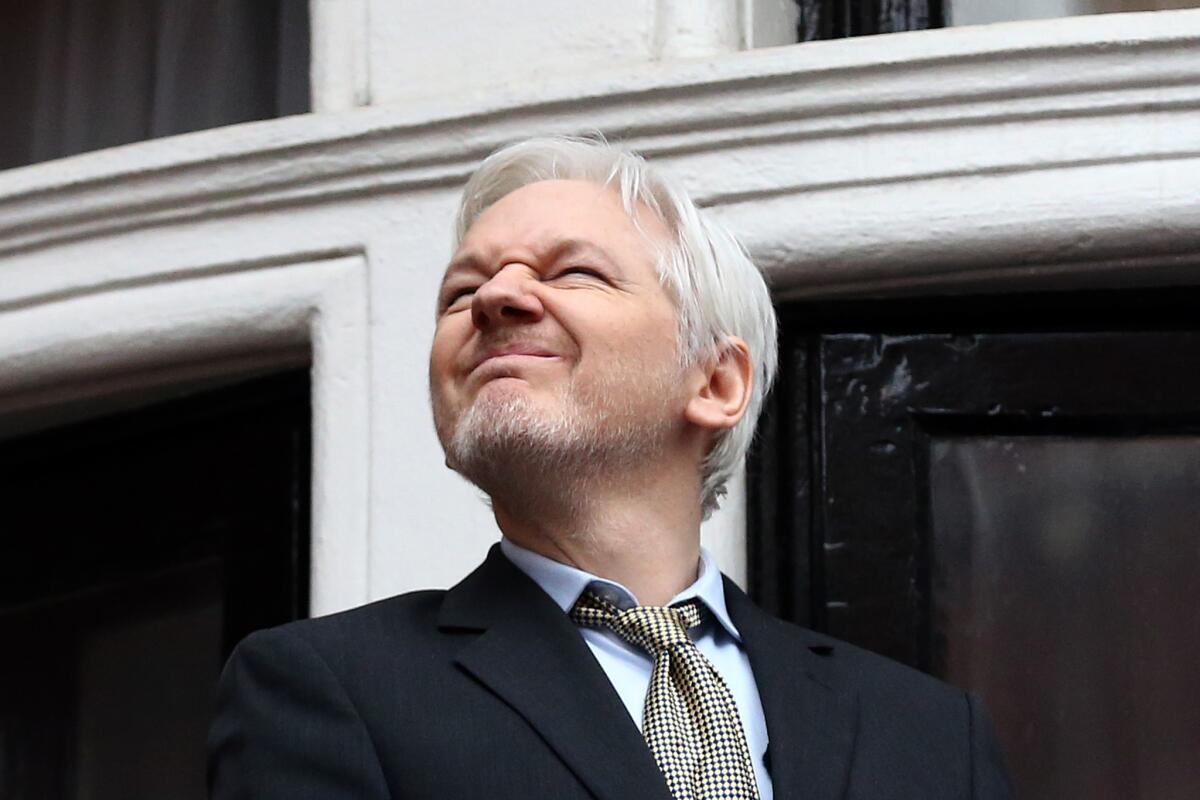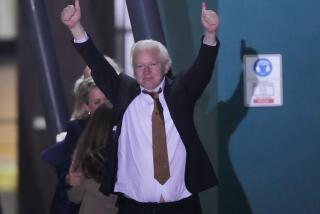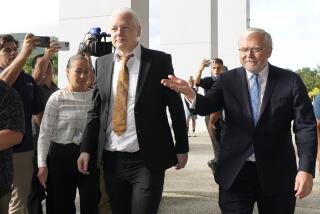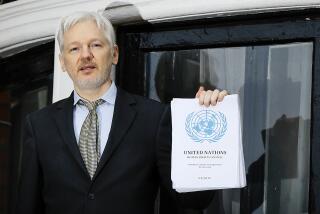Julian Assange film ‘Risk’ offers an inside look at controversial Wikileaks founder

- Share via
Reporting from CANNES, France — New administrations can mean a change in fortunes for controversial figures. But a Hillary Clinton presidency will not improve the status of Julian Assange, say those aligned with the Wikileaks founder, who remains in Ecuador’s London embassy pending a Swedish extradition request.
In fact, they argue, it could well do the opposite.
“Under Clinton [Assange’s situation] will possibly get worse,” said Wikileaks staffer Jacob Appelbaum.
Clinton was secretary of State when Wikileaks released a trove of classified cables in 2010, many of them sensitive or embarrassing to the U.S. government. Appelbaum noted a meeting he had with a senior Clinton staffer at the time that he said carried with it an air of intimidation. (Incidentally and not unexpectedly, Appelbaum was hardly bullish on Donald Trump either. “I don’t have any ideas about other candidates but I don’t think they have any ideas either.”)
The comments came as part of the world premiere of Laura Poitras’ “Risk” at the Cannes Film Festival on Thursday morning. The movie, conceived as a series of chapters about Assange, follows the Wikileaks founder from the publication of the cables and the fallout in 2010-2011 to his present state.
As with Poitras’ previous film, the Oscar-winning Edward Snowden documentary “Citizenfour,” the filmmaker is granted intimate access to her subject. Assange can be seen navigating the thicket of global media and U.S. government forces from his British home base; donning disguises in an anonymous hotel room (shades of Snowden in “Citizenfour); and, of course, at the Ecuador Embassy, where for much of the film police keep careful watch on the structure. (The film shares commonalities of only the most superficial kind with “The Fifth Estate,” Bill Condon’s poorly received Assange dramatization starring Benedict Cumberbatch in 2013.)
“Risk” grew in part out of a series of shorts in Poitras’ Field of Vision series, and it follows a chapter structure. Many relate to Assange, his crusade and the case against him; several others, such as Appelbaum confronting Egyptian tech companies over alleged censorship at a conference in Cairo, go to the broader topical issues at hand.
Those familiar with the issues will not find a lot of new information here -- it covers important but familiar ground pertaining to surveillance, the Espionage Act and the like -- but the film seeks to advance the story by showing the Wikileaks process from the inside.
In an opening sequence, Assange and his top lieutenant, Sarah Harrison, are seen letting the State Department know they are about to release the cables (in a “can I speak to Hillary Clinton” moment that will elicit laughter); when Assange gets off the phone, he reveals the government’s main objective on the call was to entrap them into espionage.
Later, viewers can see the team’s attempts at media strategy, via Assange prepping Harrison for a news conference he cannot attend, as well as the legal fallout in the case involving Wikileaks whisteblower Chelsea Manning. There is also an unexpected Lady Gaga cameo.
SIGN UP for the free Indie Focus movies newsletter >>
Throughout the film, the viewer gets a sense of Assange’s swagger and zeal, but also how small, comparatively, the operation he’s running actually is. Whether this amounts to heroism or arrogance will depend largely on one’s larger view of Wikileaks.
At a post-screening Q&A, Harrison said that freeing Assange remains a goal. Imploring the audience to “think of [his situation] walking in the Cannes sunshine,” she also laid out a case for what she said was injustice.
“Julian Assange is detained without charge,” she said. “The baseless and politicized investigation remains formally open,” she said of the Swedish preliminary investigation into sexual assault charges, adding, “Julian remains editor of Wikileaks. His courage endures. His detention and political persecution must end.”
Poitras actually began filming “Risk” before “Citizenfour,” and the two are close companion pieces.
But she said she thought it dangerous to draw parallels between Snowden and Wikileaks.
“This comparison [is] a move of the mainstream media to try and separate people,” she said. “What Snowden did came after Chelsea Manning. It’s not about comparing the two. It’s about what they’re revealing.”
Twitter: @ZeitchikLAT
ALSO
Cannes 2016: Cristian Mungiu’s ‘Graduation,’ Laura Poitras’ ‘Risk’ arrive
Feminism, Spielberg and a German showstopper: Times staffers make sense of Cannes
At Cannes, Kristen Stewart reminds us why she’s one of cinema’s most promising young actresses
More to Read
Only good movies
Get the Indie Focus newsletter, Mark Olsen's weekly guide to the world of cinema.
You may occasionally receive promotional content from the Los Angeles Times.











